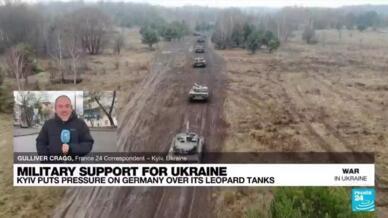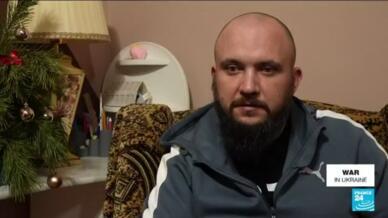British arms executives have reportedly travelled to Kyiv for discussions to set up joint ventures to manufacture British arms and military vehicles in Ukraine. Analysts agree that such a deal is on the cards, with the UK as Ukraine’s leading partner due to their close ties – and that such an agreement would ease strains on weapons supplies to Kyiv. But analysts do not expect it to be a short-term game changer, especially as long as Russian air strikes would threaten any Ukrainian weapons factories.
Executives from UK defence companies are in talks with Kyiv on allowing British-designed arms and military vehicles to be manufactured in Ukraine under licence, The Telegraph reported.
Such a deal would take an already close defence relationship up a gear. Britain has been notably generous in supplying arms to Ukraine, as the second-largest weapons donor to Kyiv. This munificence has been well appreciated in Ukraine, as demonstrated by the Ukrainian soldiers shouting “God Save The Queen!” while firing British-donated NLAW missiles at Russian tanks in the early stages of the war.
The British government has also underlined its support for Ukraine with two trips by then Prime Minister Boris Johnson and a visit by current PM Rishi Sunak soon after he entered Downing Street – all to great fanfare in Kyiv.
Anglo-Ukrainian special relationship
While The Telegraph reported that weapons firms from other European countries are also conducting talks with Kyiv on potential licencing deals, analysts expect Ukraine to put the UK first.
“The UK is the leading candidate because of the very close military co-operation between Britain and Ukraine that started under Johnson – who remains very popular in Ukraine – and which has continued under Sunak,” said Huseyn Aliyev, a specialist in the Russo-Ukrainian War at Glasgow University.
Of course, Britain is far from the only European country to send Ukraine weapons. Germany announced in late January it would send Ukraine Leopard tanks, considered especially well-suited to winter warfare. But this U-turn followed months of Berlin causing Kyiv’s pique by refusing its demands for Leopards – and it came more than a week after Britain became the first Western country to agree to send Ukraine tanks by announcing it would give Challengers to Kyiv.
Ukraine was similarly unimpressed by French President Emmanuel Macron’s statement in June that “we must not humiliate” Russia. So when Macron hosted his Ukrainian counterpart Volodymyr Zelensky at the Élysée Palace on Wednesday evening, Zelensky needed to “make it clear that he understands Macron is fully on board”, FRANCE 24 International Affairs Editor Angela Diffley observed.
Tellingly, Zelensky’s late-night dinner with Macron and German Chancellor Olaf Scholz was squeezed into his schedule at the last minute after he chose London for his second foreign trip after December’s sojourn in Washington – with Paris sending hasty invitations as Zelensky enjoyed the red carpet treatment at Downing Street, Westminster Hall and Buckingham Palace.
Indeed, comparing the UK to Germany and France fuelled Ukraine’s desire to prioritise Britain as a weapons manufacturing partner, Aliyev said: “When it comes to other European states, Germany only recently started supplying significant amounts of heavy weaponry – and not sufficient amounts for Ukraine – while France has not supplied weapons with the same level of eagerness as the UK,” he put it.
US probably ‘already given approval’
But for all the strength of the Anglo-Ukrainian relationship, there is no doubt that Washington is Kyiv’s all-important partner. The US hegemon is Ukraine’s biggest weapons supplier by far, although the White House has at times underlined there is no blank cheque for Kyiv, as it does not want Ukraine to escalate the conflict to the point of risking World War III. When Zelensky visited the White House, President Joe Biden was notably firm in his refusal to send Ukraine US long-range ATACM missiles, which would be able to hit targets deep within Russia.
So getting the US onside is crucial for any Ukrainian plans to make Western-designed weapons on its soil. This will have factored into Kyiv’s choice of London as its foremost partner for the venture, said Jeff Hawn, a non-resident fellow at US geopolitical research centre the New Lines Institute: “The special relationship between the US and the UK will likely have featured in their calculations because getting the UK on board is a way of facilitating the US’s involvement,” he said.
In any case, it looks likely that the US has “already given its approval” for a UK-Ukraine weapons licensing deal, Aliyev said. Manufacturing Western-designed weapons on Ukrainian territory would align with Washington’s priorities – most obviously because, like its NATO allies, the US has been running down its stocks to aid Ukraine far more quickly than its defence contractors can replenish them. Indeed, NATO Secretary-General Jens Stoltenberg warned on Monday that the alliance must “ramp up” ammunition production amid depleted stockpiles.
The possible deal with British firms is the “kind of thing Washington wants to see”, Hawn underlined. “It would integrate Ukraine into the Western defence sphere and make it more self-sufficient, when arming Ukraine has stretched the US’s own stockpiles far further than it would have liked.”
Having Western arms produced closer to the front lines would also “ease quite a lot the logistical burden” inherent in getting plentiful American weapons to the other side of Europe, Aliyev added.
“But the US is not likely to share with Ukraine the classified technology behind some of its most sophisticated weapons, such as military drones,” Aliyev cautioned. Any deal to make Western-designed arms in Ukraine will “probably involve things like artillery and armoured vehicles,” he said. “It should not necessarily be seen as an escalation of the conflict but primarily as a step to simplify logistics.”
‘Outstripped in arms race’
In light of this, a weapons licensing agreement would not be a “game changer” for Ukraine, Aliyev emphasised. But it would still proffer significant benefits – experts agree that anything allowing Ukraine to get its hands on more weapons would be invaluable for its military effort.
The Ukrainians “could gain a lot by having Western-quality weapons on their own soil without having to depend on these infrequent deliveries by their Western partners”, Aliyev noted.
Run-down ammunition supplies are one of Kyiv’s most pressing concerns, with Ukraine and its partners resorting to far-flung countries like South Korea and Pakistan as sources of artillery munitions. And Russia has a long history of using overwhelming artillery barrages to prevail militarily – a tactic going back to the Tsarist era; one Moscow most recently deployed successfully in the Battle of Sieverodonetsk in eastern Ukraine last June.
“At this moment Ukraine is still significantly outstripped by Russia in their arms race,” Aliyev pointed out – and not just in terms of heavy weapons like artillery. “Russia is still far ahead of Ukraine in terms of its numbers of tanks, armoured vehicles, helicopters and fighter jets. It will take Ukraine quite a while to catch up – although it depends on what happens with Russia’s military weapons construction, which is suffering from a lack of components imported from the West; it still gets such imports from China but they are not on the same level.”
‘High risk’
Making weapons could be highly profitable as well as a military boon for Ukraine, which from an economic angle looks well-suited to ramping up defence manufacturing: the Soviet Union’s over-industrialised economy left it with ample infrastructure, before the Ukrainian economy’s under-performance after the collapse of communism left it with lots of spare capacity.
“Ukraine’s had an extensive military-industrial complex during the USSR, which suffered highly after the Cold War, as it lost its major customer and was then looted by oligarchs – but it still has very good long-term material for a military-industrial base,” Hawn said. A licensing deal with a country like the UK would be a “great opportunity” for Ukraine’s war-battered economy, Aliyev added.
However, the idea of all that defence industry infrastructure at work in Ukraine points to the biggest question hanging over any licensing deal: any such factories would be within the range of Russian air strikes.
“It would be high risk to have a Western company – when talking about the UK it looks like we’re talking about [the biggest British defence company] BAE Systems – having factories on the ground in Ukraine,” Hawn put it. “They would be heavily defended, but Russia is deploying systems that can reach everywhere within Ukraine, even if they’re not always very accurate.”
Meanwhile Ukraine’s manufacturing infrastructure is not so well suited to complex defence projects, which typically take a few years to become operational. “Ukraine is well-suited to manufacturing simple systems like ammunition relatively quickly, but high-tech equipment is more of a long-term prospect,” Hawn said.
So analysts expect Ukraine to concentrate on more low-tech forms of equipment to start with, before building up to more advanced production if the war progresses sufficiently in its favour.
Ukrainian manufacturing may well have to start just outside its territory, with workers commuting to a neighbouring ally. “I would expect Ukrainian production to start in Poland near the border and then moved to Ukraine when it becomes safer as the conflict moves closer to completion, though there is still the opportunity to have smaller-scale production on Ukrainian soil, as it would be easier to conceal and move around,” Aliyev said. “Then at a later stage of the war we can expect to see full-scale, more high-tech production on Ukrainian soil,” he concluded.
Source link
#deal #Kyiv #Western #weapons #Ukraine

%20(1).png)










.JPG)








.jpg)

